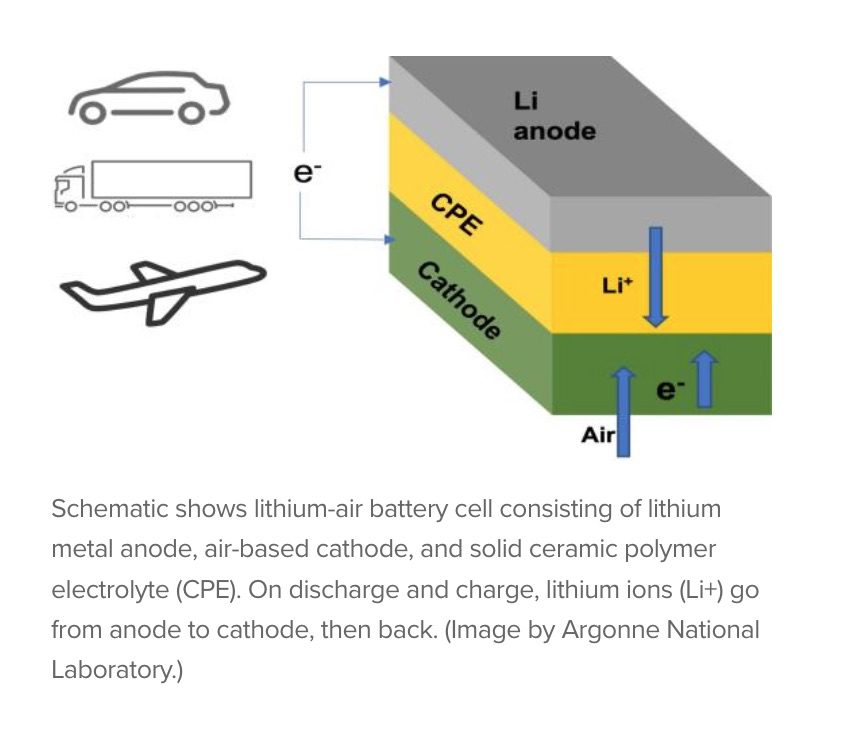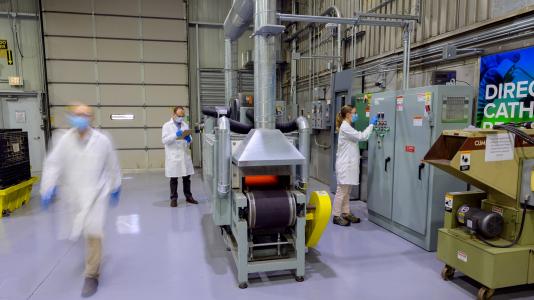Scientists and engineers at US-based technology research centre Argonne say they have developed a new battery which they say has four times the energy density of lithium-ion batteries.
The researchers from the Illinois Institute of Technology (IIT) and U.S. Department of Energy’s (DOE) Argonne National Laboratory say that the new battery could power an EV for more than a thousand miles (1600 km) and could also someday be used to power domestic planes and long-haul trucks.
“The main new component in this lithium-air battery is a solid electrolyte instead of the usual liquid variety,” Argonne says in a press release.
“The battery chemistry with the solid electrolyte can potentially boost the energy density by as much as four times above lithium-ion batteries, which translates into longer driving range.”

More electrons stored means higher energy density
Argonne Distinguished Fellow Larry Curtiss says the lithium-air battery has the highest projected energy density of any battery technology being considered for the next generation of batteries beyond lithium-ion.
“For over a decade, scientists at Argonne and elsewhere have been working overtime to develop a lithium battery that makes use of the oxygen in air,” Curtiss said.
Argonne says that in past lithium-air designs, the lithium in a lithium metal anode moves through a liquid electrolyte to combine with oxygen during the discharge, yielding lithium peroxide (Li2O2) or superoxide (LiO2) at the cathode.
The lithium peroxide or superoxide is then broken back down into its lithium and oxygen components during the charge. This chemical sequence stores and releases energy on demand.
Argonne says the new solid electrolyte is composed of a ceramic polymer material made from relatively inexpensive elements in nanoparticle form. This new solid enables chemical reactions that produce lithium oxide (Li2O) on discharge.
“The chemical reaction for lithium superoxide or peroxide only involves one or two electrons stored per oxygen molecule, whereas that for lithium oxide involves four electrons,” said Argonne chemist Rachid Amine.
Argonne says the new lithium-air design is the first lithium-air battery that has achieved a four-electron reaction at room temperature. It also operates with oxygen supplied by air from the surrounding environment.
The capability to run with air avoids the need for oxygen tanks to operate, which Argonne says was a problem with earlier designs.
“With further development, we expect our new design for the lithium-air battery to also reach a record energy density of 1200 watt-hours per kilogram,” said Curtiss. “That is nearly four times better than lithium-ion batteries.”
For comparison Tesla’s new 4680 cells have an energy density of 272-296 Wh/kg and which is considered very high by current standards. At 4 times the that density, the new cells would open up all sorts of possibilities including aircraft that could fly well over 1000 km on a single charge.

Daniel Bleakley is a clean technology researcher and advocate with a background in engineering and business. He has a strong interest in electric vehicles, renewable energy, manufacturing and public policy.

